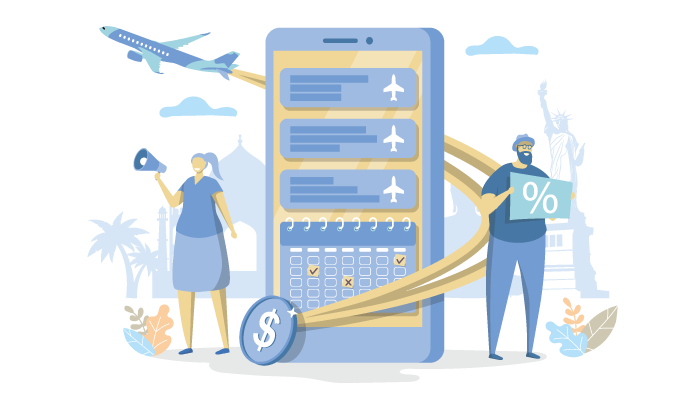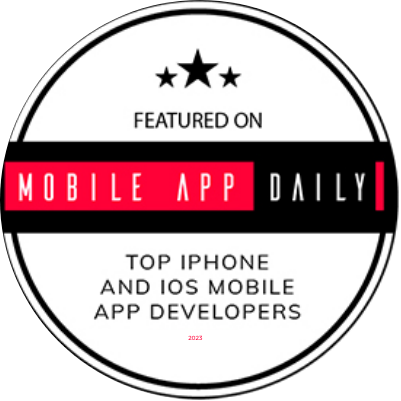Ready to take off? Discover the soaring world of flight booking app development! Whether it is secure bookings, flight booking apps have revolutionized the way we travel!
Today, Flight ticket booking app development is constantly evolving, and keeping up with the latest trends and advancements.These apps offer convenience, flexibility, and accessibility allowing travelersto book flights, manage bookings and explore travel options at their fingertips.
Moreover, flight booking apps have transformed the way people plan and book their trips making the travel experience more seamless and efficient.
The best thing about flight booking apps is they provide a one-stop solution for all travel-related needs. With the increasing reliance on mobile devices, flight booking apps have become an essential part of modern travel, offering convenience, time-saving, and user experience.
According to Statista, the flight segment revenue is projected to reach US$0.63tn in 2023.And is expected to show an annual growth rate of 4.63% CAGR (2023-2027).
In in-flight segments, the total revenue of around 87% is generated through online sales by 2027.
This data shows a clear indication ofa lot of growth opportunities in this segment. If you are planning to build your mobile flight booking app. Don’t worry with this blog you’ll get to know about everything related to flight booking app development.
Let’s dive right in!
Brief about flight booking app development

When it comes to flight tickets booking app development involves the creation and implementation of mobile apps that enable users to search, book, and manage flights.
With flight booking apps users can search for flights based on various criteria such as destination, date, and price. Plus, users can also view flight details, compare prices, select seats and make payments securely and receive real-time flight updates.
These apps offer additional features such as loyalty programs, personalized recommendations, and social sharing options. Not only it provides the convenience of booking flights at any time but also provides access to exclusive offers and discounts.
Benefits of flight booking app development

Let’s look at the benefits of flight booking app development:
| Convenience | With the flight ticket booking app, users get the convenience of booking and managing flight tickets anytime. This eliminates the need to visit a physical travel agency or spend time on a desktop website. |
| Rewards and promo codes | Mobile flight booking apps offer reward and promo codes to incentivize users to book through their app. Rewards can be discounts on flights, cashback, loyalty points, and exclusive offers. |
| Real-time updates | Flight booking apps can provide real-time updates on flight schedules, delays, and cancellations. This helps users to stay updated with travel plans and make necessary adjustments in case of any changes. |
| Payment Security | The online flight booking app typically offers secure payment options, including encrypted transactions and multiple payment gateways. |
| Increased revenue opportunities | These apps can generate revenue through various channels, such as commissions from an airline, and advertising partnerships. |
| Market reach | A well-designed flight booking app can reach a wider audience, including both leisure and business travelers. This can help app owners tap into a larger market and increase their customer base. |
Popular apps and websites for flight ticket booking

If you want to start custom flight booking app development, look at some of the best flight ticket booking apps available in the market. Flight booking apps tailored for business travelers can provide features such as centralized booking management, expense tracking, and reporting tools.
Here is the best flight booking app available in the market such as:
| Expedia | Skiplagged |
| Skyscanner | Hopper |
| Momondo | Ixigo |
| Kayak | Orbitz |
Latest trends and advancements in flight booking app development
Flight booking app development has been continuously evolving to keep up with the latest trends and advancements in technology. Some of the latest trends and advancements in flight booking software include:
Personalization and customization
Flight booking apps are leveraging data and analytics to provide a personalized and customized experience to users. This includes offering tailored flight options based on user preferences, and past travel history.
Moreover, customized recommendations, special offers, and targeted promotions are being integrated into the apps to enhance user experience.
Real-time updates and notifications
Airline booking app are incorporating real-time updates and notifications to keep users informed about their flight status, delays, and cancellations.
Plus, it helps users to stay updated with their travel plans and make necessary adjustments in case of any changes.
Augmented reality and virtual reality
While starting flight tickets booking app development, AR and VR technologies are being used in flight booking apps to provide users with immersive experiences.
With this users can take virtual cabin tours, and select a seat in 3D and AR-based navigation within airports providing users with a unique interactive booking experience.
Artificial intelligence and Chatbots
For personalized recommendations, AI and Chatbots are being used in flight booking apps. It also assists with customer queries and offers real-time support.
Blockchain technology
While starting with flight ticket booking app development, blockchain technology is being explored for its potential to enhance the security and transparency of flight bookings.
In addition, this includes features such as decentralized identity verification, and smart contracts for secure and transparent transactions. Plus, loyalty programs are based on blockchain tokens.
Multilingual and multi-currency support
Flight reservation appis increasingly providing multilingual and multi-currency support to cater to a global user base. With this, it offers multiple language options, localized content, and support for various currencies and payment methods.
Business model of a flight booking mobile app

While starting flight ticket booking app development or starting booking agent app two categories of business. These models play a crucial role in ensuring smooth and efficient flight booking experiences for users.
Let’s look at these two models:
Dedicated model
This model is admired mostly among all travel mobile app development company. It refers to a flight booking app that is solely operated and managed by a single airline or travel agency.
However, this model is developed or maintained by an airline or travel agency. This gave the travel agency complete control over the entire booking process from start to finish.
The dedicated model allows for direct communication and interaction between the airline or travel agency and the customers.
Aggregator model
The aggregator model refers to a flight booking app that aggregates flight options and fares from multiple airlines and travel agencies. This model acts as an intermediate, connecting users with various airlines and travel agencies and processing transactions on their behalf.
Moreover, this app typically displays flights, fares, and services from different providers. This helps users to compare and choose the best option based on their preferences and budget.
Both models have their unique strengths and limitations. The dedicated model offersa more focused and personalized experience while the aggregator model offers broader choices and flexibility.
Regardless of the model chosen, efficient transaction processing is crucial to ensure smooth and secure flight bookings, payments, and cancellations. It is recommended to consult with flight booking app development company while starting flight booking app development.
Steps to build a flight booking mobile app

If you want to build a booking app, consult the cost of flight booking app development before starting the development process. The crucial development process becomes easy when you have a reliable development partner.
Here is the step-by-step guide to create a flight booking appinclude:
Define scope and requirements
Before starting flight ticket booking app development, identify the goals and objectives of your flight booking app. plus, including the target audience, desired features, and functionalities.
Market research
The second process is doing market research to understand user preferences, competitor analysis, and industry trends.
Also,create a comprehensive project scope and requirements document that outlines the app’s features, user flow, design, and development guidelines.
Choose tech stack
Choosing the right tech stack will save you time and money. This is the crucial process you have to choose frameworks and side servers, APIs, and many more. It is important to consult with your travel mobile app development team will save you time and help in making the right decision.
Front and backend development
Now design the user interface of the mobile flight booking app. Develop wireframes and mockups to visualize the app’s user interface.
Moreover, consider the app’s usability, accessibility, and overall user experience to create an intuitive and visually appealing design. This will help you in increasing client retention rates.
Testing
After completing the flight booking app development process, start testing the app to ensure its functionality, performance, and usability. As a result, this will help you to identify and fix bugs and issues discovered during testing and optimizing the app for different devices.
Deploy and launch the app
Prepare the app for deployment by configuring servers, databases, and other required settings. Plus, publish the app to the relevant app stores, such as the Apple App Store and Google Play Store.
Maintenance
To maintain the app in the market for a long time you have to continuously invest in maintenance services. Although when you update the app regularly with bug fixes, security patches, and new features to enhance its functionality and user experience.
Overall, the flight booking app development requires careful planning, design, and development to ensure a successful launch. It is important to work with experienced developers and follow best practices to build flight booking app.
Cost to build a flight booking app

The flight booking app development cost can vary greatly depending on various factors such as the complexity of features, the platform, and the development timeline. However, here is a rough estimate of the cost of flight tickets booking app development:
travel app development cost
Basic flight booking app
- For a single platform (either iOS or Android): $10,000 to $30,000
- For both iOS and Android platforms: $20,000 to $60,000
Advanced flight booking app
- For a single platform (either iOS or Android): $30,000 to $80,000
- For both iOS and Android platforms: $50,000 to $120,000
Highlycustomized flight booking app
- For a single platform (either iOS or Android): $80,000 to $200,000 or more
- For both iOS and Android platforms: $150,000 to $300,000 or more
These are rough estimates and can vary depending on the specific requirements and complexities of the project. It is essential to consider the overall cost of the app including maintenance, updates, and server costs. It is recommended to work with a professional mobile app development company to get an accurate estimation based on your project requirements.
Conclusion
In this highly competitive market, a well-designed and feature-rich flight booking app can provide an edge over competitors.
With the increasing demand for travel and the growing popularity of online flight bookings having a well-designed and functional flight booking app can be a lucrative business opportunity
In this flight booking app development blog, we have discussed the key aspects of building a successful app, with a focus on the keyword “flight booking app development“.
If you want to launch your flight booking app in the market, feel free to contact us.
FAQs
Flight booking app development refers to the process of creating mobile applications. This allows users to search, book, and manage flights through their smartphones or other mobile devices.
Flight booking apps provide convenience and accessibility to travelers, allowing them to book flights anytime, anywhere. Businesses can benefit from increased customer engagement, loyalty, and revenue through a well-designed and functional flight booking app.
Key features of a successful flight booking app may include
- Search and booking functionalities
- payment and checkout options
- integrations with third-party services
- payment gateways
- travel agencies
A seamless user experience in a flight booking app can be achieved through intuitive UI/UX design, smooth navigation, an easy booking process, and responsive customer support.
Challenges in flight booking app development may include
- security and data privacy concerns
- integration with multiple booking systems
- APIs, user trust, and reliability

Niketan Sharma is the CTO of Nimble AppGenie, a prominent website and mobile app development company in the USA that is delivering excellence with a commitment to boosting business growth & maximizing customer satisfaction. He is a highly motivated individual who helps SMEs and startups grow in this dynamic market with the latest technology and innovation.
Table of Contents












No Comments
Comments are closed.